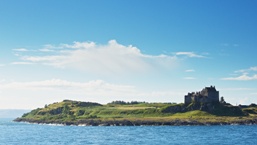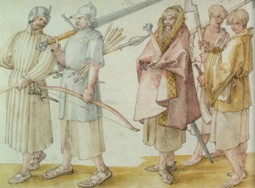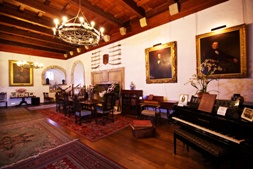Duart Castle: A Stronghold on the Edge of the World in the Midst of History

(Image courtesy of Duart Castle)
Today a wind blusters off the North Sea, gnawing away at the Scottish summer and I’m a tank.
Arms serving as sponson-mounted guns, I trundle up the path waiting for the ambush. The boys have vanished into the bracken ahead and I’m going to spot them before they get behind me…
“Bang bang bang bang!” Long hair as wild as wood-elf’s, Morgenstern, my 6-year old daughter, explodes out of the greenery, pink boots crushing the foliage. “Got you, Daddy!”
“Ha!” I say. “You’re making machine gun sounds. That won’t do anything against a tank.”
Morgenstern grins and explains as if to an idiot: “No, Daddy, I’m using a plasma gun from Halo*.”
*Geek Parenting Tip: Most games are age appropriate if you hold your finger over the “1” when showing the PEGI rating to older relatives.
I want to tell her that plasma guns are off topic, but then I look to my right and grin. We’re playing around the rocky base of Duart Castle on the Isle of Mull, seat of the Macleans since the mid 14th century.
You know the castles you read about in Fantasy epics? Where the family history is woven into the fabric? Where the rooms are wrapped in story? That’s Duart.

The sea-slashed West Coast of Scotland feels like the edge of the world now, but the isolating waters were once a ship road, an autobahn for clinker-built vessels to raid and trade up around the Atlantic coast and Irish Sea.
This is where the Vikings and Celts fought to a standstill, then through a Darwinian process bred a race of super soldiers known as the Galloglasses. Nobody dared tell them that the Viking Age was over, even as bows gave way to muskets. When one lord of Duart fell in battle, his warband died fighting around his body — and that was in the AD1600s!
When the tide is low, look out from the Sea Gallery and spot the rock where a chieftain left his allegedly murderous wife to drown. (She was rescued by her kin, and an amusing George RR Martin-style reunion is said to have resulted). Peer into the dungeons where Spanish Armada prisoners languished after their captain tried to steal supplies. (He was supposed to pay by lending infantry for a local feud, but then tried to slip away taking clansmen as hostages. One of them set light to the powder store and the gallion still lies in Tobermory Bay.)

(Image courtesy of Duart Castle)
Now wander the weapon-lined Great Hall and listen while the kilted guide spins yarns around the family treasures: hooves from a cavalry mount that survived the Charge of the Light Brigade; a pair of highwayman’s pistols (his skeleton is said to reside in an anatomical museum in London); guns from every shooting war since the 16th century; a Napoleonic-era cavalry sword presented to a Maclean by a man whose life he saved, then worn by the soldiers in the family into the 20th century…
Upstairs there’s more militaria, and more displays and you learn about Sir Fitroy Maclean, swashbuckling WWII special forces operative and writer, and any ancestors you might have missed.
By then you realise that the Macleans have been in every major Scottish battle since Largs in 1263, including Bannockburn and Culloden. They fought for the crown and against it, took up the red coat to defeat Napoleon, then helped paint the map a similar shade. When red uniforms gave way to khaki, the Macleans were still there, doing their duty, following their calling.
Just before you climb onto the roof, there’s a display about a NASA astronaut, also a Maclean.
So.
If Humanity goes to the stars and finds them ridden with hostile aliens… if there’s powered armour to don, and plasma guns to wield, then somewhere in the maelstrom you’ll find a Maclean officer giving orders, leading from the front, just as his or her ancestors did a thousand years before.
“Well done! You got me.” I give my daughter a hug. “I guess a plasma gun would do it nicely.”
M Harold Page (www.mharoldpage.com) is a Scottish-based writer and swordsman with several Historical Adventure franchise books in print. His creative writing handbook, Storyteller Tools is available on Amazon. He recently survived Loncon3.
Your posts are quite enjoyable Martin, thanks for sharing your grand daily adventure 🙂
[…] you explore Scottish castles and grand houses, there’s always a room with swords decking the walls, bits of uniform, trophies from India, and portraits of young men in […]